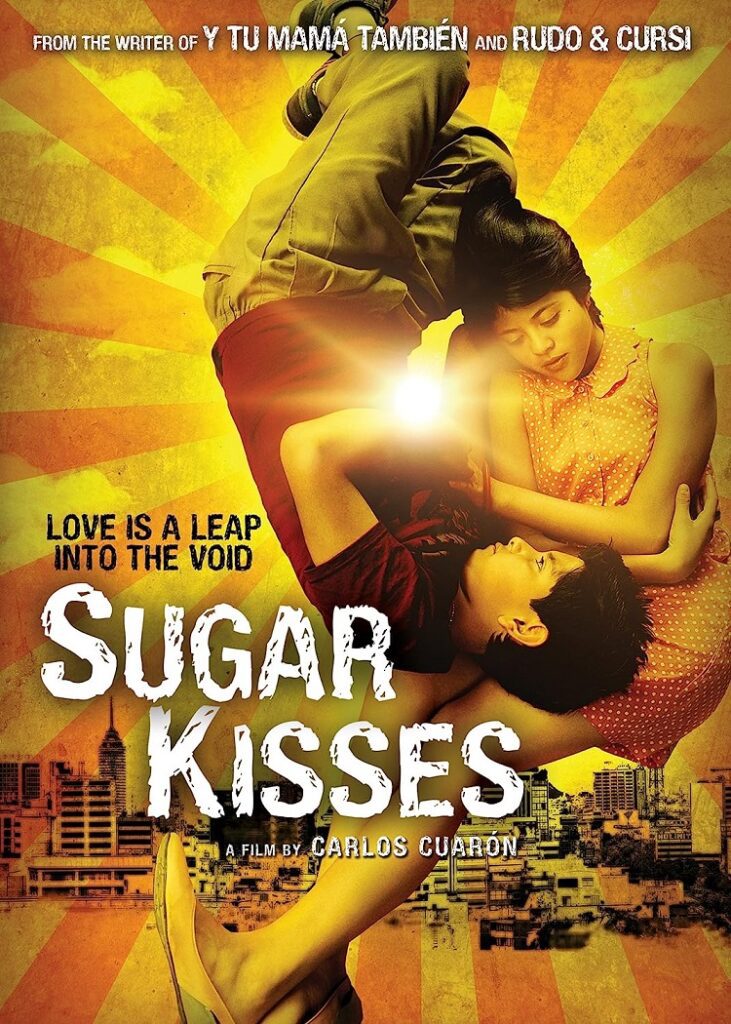
Carlos Cuarón’s 2013 film Sugar Kisses is part street fable and part Shakespearean tragedy. The screenplay by Cuarón and Luis Usabiaga brims with the clarity of young love and juxtaposes it against the darkness of crime and domestic punishment. It’s a familiar tale and at times Cuarón’s affection for clichés gets in the way, but there’s still a lot to like about this picture.
Cuarón is the brother of Gravity and Y Tu Mamá También director Alfonso Cuarón and he wrote the screenplay for the latter, which was a sensual coming-of-age narrative that shares a lot with Sugar Kisses. But this movie plays to a younger set, at least in theory, and contends less with the roads of rural Mexico and more with the teeming city streets.
César Kancino is Nacho, a 13-year-old boy trying to make his way through life. He lives with his traffic cop mother and a stepfather (Enrique Arreola) who sells bootleg pornography at a market stall. One day, Nacho sets his eyes on the beautiful Mayra (Daniela Arce) and he’s smitten. But there’s a problem: she’s the daughter of crime boss Diabla (Veronica Falcón).
Diabla, who favours the snake Brayan (Kristyan Ferrer) to her daughter, doesn’t want Mayra to have anything to do with such a lowly boy. And Nacho’s family gives him the boot over a camera he snags during a police raid, leaving him on the streets with nothing but the support of his 27-year-old bestie Cacayo (Héctor Jiménez) and his beloved Mayra to rely on.
The adults of Sugar Kisses are essentially reprehensible, with the exception of Cacayo. He’s the type of man who paints over the nudity in pinup posters because he wants to protect them from sin. He offers timid shelter for Nacho and is legitimately hurt when his young friend ditches him for the girl. And his unsophisticated advice on how to make love to a woman is naïve in the best of ways.
Nacho has it rough, to say the least. He longs for his father, who apparently absconded to America but is only photographed on the Mexican side of the border. His mother tells him that he’s a fool and his siblings keep ratting him out. And his stepfather wails on him, even as his plaintive eyes fall against his mom’s callousness.
Mayra, too, is a victim of domestic destruction. Her brother attempts to rape her and her mother doesn’t believe the truth. She may have the wealth and reputation of Diabla’s name, but she is more like her absent father and therefore viewed as weak.
Sugar Kisses pushes two delicate angels together and allows them a few moments of peace and quiet, like when Cuarón and cinematographer Kenji Katori capture the couple playing the dance game in the arcade. Nacho’s shelter offers asylum, with a dilapidated mattress providing a soft place to fall. Later, the movie’s climax allows for an act of what could be described as a joyous belief in panties.
At times, Cuarón’s picture seems a touch on the cartoonish side. Diabla and her plundering son ditch any façade of subtlety, especially when they chase Nacho and Mayra with guns blazing and horns blaring. It’s somewhat of an essential calamity, however, and it brings the youthful leap of faith to bear in a palpable yet fantastical way.
Sugar Kisses illustrates the refuge of adoration in vibrant terms. Nacho and Mayra exist in a world without affection and compassion. They find love in each other, even as everything around them crumbles. It’s a narrative that is fundamentally as old as the hills, but Kancino and Arce’s gravity is hard to resist. They have stars in their eyes.
And like Shakespeare’s tale of star-crossed lovers, the young love of Sugar Kisses smooths “the rough touch with a tender kiss.” The streets are no place for children, but Cuarón’s protagonists refuse to let the world ruin them. They refuse to stop dancing.
Sugar Kisses is available from the good people at Strand Releasing on April 12. The DVD release includes theatrical trailers and a behind-the-scenes feature, as well as English subtitles for the Spanish audio.